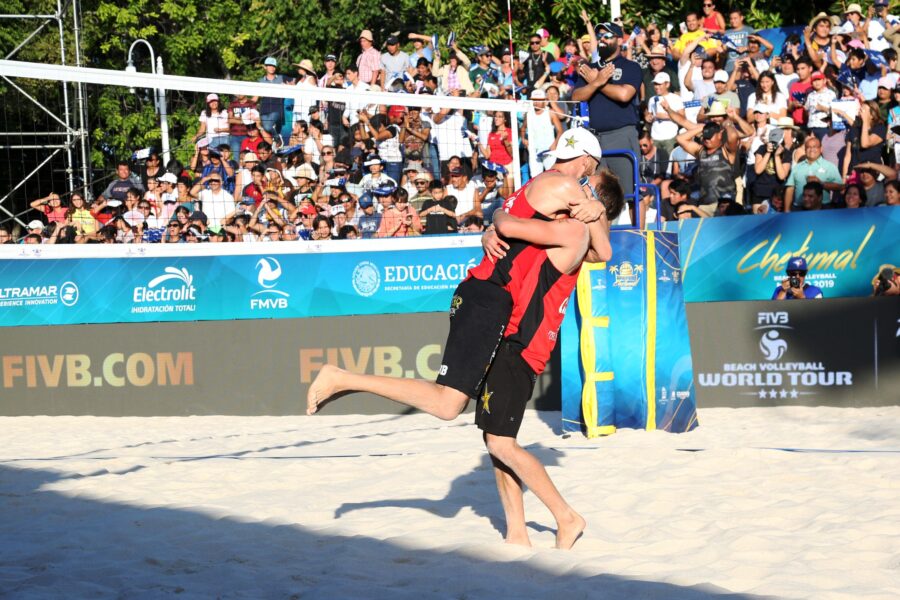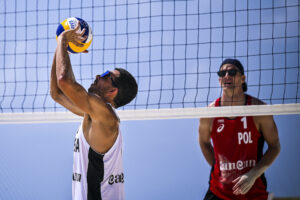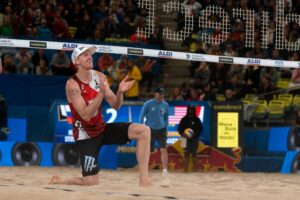For more than a decade — and nearly two, in fact — Matt Callahan has seen it all. He’s seen the players living out of their cars and vans and modified trucks. He’s seen the athletes who burn upwards of 3,000 calories a day subsisting off a diet of peanut butter and jelly and ramen noodles. He’s seen Olympic caliber talents making smoothies for 12 bucks an hour at the local gym, waiting tables, tending bar, coaching and coaching and coaching some more.
“For seventeen years,” Callahan said, “I have watched beach volleyball players struggle financially with no system or structure in place to help them and nobody really caring.”
So he’s doing something few ever actually take the initiative to do: He’s providing a solution.
Callahan, along with professional beach volleyball player and writer, Travis Mewhirter, founded a non-profit organization, Chasing Gold, aimed at solving — or at the very least, alleviating — the aforementioned issues that have long since plagued the sport of beach volleyball. It’s a business designed to market the ebullient talents that the United States boasts, to attract sponsors and provide a financial security blanket to ensure that they no longer have to work two, three, four side jobs while also training and traveling full-time.
“The overall goal of Chasing Gold is to let these players focus on their craft without having three to five jobs and worried monthly how the bills get paid, the coaches get paid, can I eat this month,” Callahan said. “That way, they can perform at their best.”
Donate to Chasing Gold today!
If there is a man for the job, Callahan is that man. He is the rare type who brings a sharp business acumen to the sport of beach volleyball. He has more than 30 years of experience in the entrepreneurial space, rising to become the National Salesperson of the Year at Polaroid. He ushered Crusader Printing from a boutique startup to $40 million in sales within just three years, securing contracts with giants such as Avon, Colgate, and Kraft Foods. In his first foray in the non-profit sector, Callahan wrote the business plan for United Christian Charities of America, becoming its first Executive Director and securing $5 million in start-up funding.
“Being a CEO and working with Fortune 50 Companies for a large portion of my career, I understand what a corporation wants, how they work, how they think and what an athlete needs,” Callahan said. “The lightbulb went off. A total win-win structure and situation that businesses will love.”
Because of its 501(c)(3) nature, businesses get the benefit of all contributions to Chasing Gold being fully tax deductible, while the players under Chasing Gold’s umbrella will, perhaps for the first time in their careers, get the opportunity to focus exclusively on their craft.
Only once in his entire career has Casey Patterson been able to simply train full-time on the beach. That came during the 2016 Olympic quad, and it is no surprise that those four years were the most successful of his career. From 2013-2016, Patterson and his partner, Jake Gibb, won 16 AVPs, two FIVBs, and qualified for the Rio Olympics. In 2013, they were named the USAV Beach Team of the Year, and thrice the AVP Team of the Year.
“That was the only opportunity I’ve had where the only thing I did was play volleyball,” said Patterson, who is one of Chasing Gold’s athletes and its unofficial spokesman. “Some people will be like ‘Dude what’s it like being pro?’ I’m just like ‘Listen it’s way harder for specific teams and federations vs. others. If you’re from Russia and you’re a top team, all you do is lift and play volleyball, watch film, that’s all you do. If you’re from Norway and you’ve done it your whole life, that’s all you do. You don’t have to work multiple jobs and leverage how to get sponsors. People just take care of that for you. To be like ‘All I do is perfect my craft.’ It was like ‘Oh!’ That’s the ultimate dream, just all in, and I’m going to trust the process.
“A lot of guys will say ‘I wish I had your job’ and I’ll say ‘No you don’t.’ There’s so many variables fighting against it aside from the financial side that you really have to be stupid, obsessed, and passionate about it to be successful. You also have to be physically talented or you do a few things really well, and you’re getting sponsors, it’s such a hard thing to put together. These NBA guys can show up and get paid whether they win or lose, and man that would be really nice. If I win, cool.
“You just become this ultimate utility man. Social media? I can do that. Photographer? I could do that. Coach a clinic on the other side of the world and come back and play? Sure. It’s a constant world of stress and what-ifs and your wife is wondering what’s going to happen, are you ever going to provide for me consistently?”
It’s Chasing Gold’s mission to provide the answer to that very question, bridging the gap between sponsor and athlete, business and beach, competing and providing.
“I watch players devalue themselves for free volleyballs, free sunglasses, free training, free whatever-they-can-get. It sickens me,” Callahan said. “I spent a day at the beach talking to players, realizing that volleyball is their specialty, not business, and they need help or this amazing sport is going to die. Zero systems, zero structure, nothing in place to help them survive and nobody cares but we expect to produce Olympic Champions.”
Which is why, of Chasing Gold’s 10 athletes, all 10 are aspiring Olympians. Some, like Tri Bourne, Trevor Crabb, Sarah Sponcil, Kelly Claes, Emily Stockman, and Kelley Kolinske, are currently in the thick of the race for Tokyo. Bourne and Crabb are one spot out at the moment, as are Claes and Sponcil. Stockman and Kolinske are also in contention, one spot behind Claes and Sponcil. The remaining three athletes — Traci Callahan, Delaney Mewhirter, Bill Kolinske – have their sights set on the 2024 Paris Games.
It’s a company designed to alleviate the financial pressure of those who are Chasing Gold.





